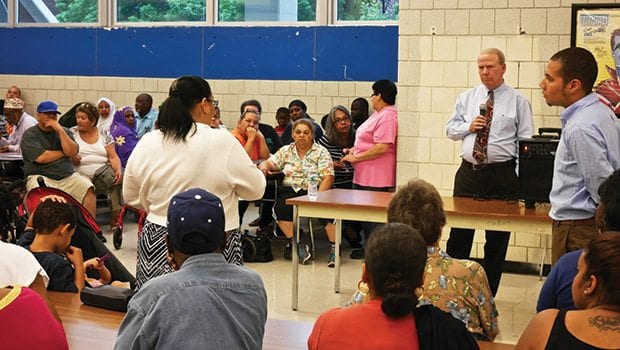
The Boston Housing Authority has moved a step closer to tapping private development dollars in the face of public funding gaps that make it difficult to operate and improve its aging housing stock.
In a public meeting May 28 at Charlestown High School, BHA Director Bill McGonagle outlined the agency’s plan to issue a Request for Proposals to transform the nearby Bunker Hill development into an expanded, mixed-income complex.
Federal funding for public housing has fallen steadily over recent years, leaving the BHA and other public housing authorities across the nation struggling, McGonagle explained.
“This has required us to start thinking of ways we had not thought about before to renovate and preserve public housing,” he said.
As one new strategy, the BHA wants to allow private developers to build new commercial space or market-rate housing units on BHA properties.
Last fall, the agency released a Request for Qualifications to gauge interest on the part of nonprofit and for-profit developers for refurbishing BHA developments in high-market areas where development could be profitable. The RFQ generated “significant interest” in about 18 of the BHA’s 63 developments, McGonagle said. The May 28 meeting was to discuss the next step: the issuance in a few weeks of a Request for Proposals to which developers can respond with their ideas and plans for expanding housing on the Bunker Hill site.
Bunker Hill is the largest of Boston’s public housing developments, with more than 1,100 units in low-rise brick buildings closely spaced over several blocks between Charlestown High School and the Tobin Bridge. It is also one of the oldest, designed in the 1930s and built in 1940.
The complex contains little unused land, so Bunker Hill proposals will likely involve demolishing existing buildings and creating larger ones. Any redevelopment would contain at least the same number of affordable units, updated to 21st century standards, while adding market-rate and middle-priced “workforce” units to help support the public housing.
“In short, the concept is to recreate the Bunker Hill housing community … as an economically integrated community,” McGonagle said.
Redevelopment would be funded through federal Section 8 subsidies, tax credits, private equity investment and possibly city of Boston funding for infrastructure.
McGonagle cited previous examples of public-private partnerships that he said resulted in a “significantly improved public housing community,” such as the transformations of Columbia Point to Harbor Point, and Orchard Park to Orchard Gardens.
The Bunker Hill transformation would begin in about two years, and likely would involve relocating about 25 percent of current residents at a time while portions of the complex are torn down and rebuilt in phases. That process could put residents outside of Charlestown for six months to a year, he said.
BHA staff had already discussed the plans and process with Bunker Hill tenants, but this was the first public meeting. About 250 people from the housing development and beyond crowded into the school cafeteria. McGonagle’s presentation was brief, and the meeting was opened to questions after about 15 minutes. An interpreter repeated every statement and question in Spanish.
Current Bunker Hill residents focused largely on practical issues, probing repeatedly whether all existing residents would be able to move back in (Yes) with the same unit size and amenities (Yes) and whether the current affordability standards would be maintained (Yes). Several asked how the temporary dislocation would be handled, and were told the BHA would provide help with finding apartments and moving expenses.
McGonagle noted that in previous projects only about half of relocated residents wished to return after redevelopment.
A resident of the wider Charlestown neighborhood expressed concerns about parking issues and added building height. Another said he would not want to see the local streetscape altered.
Some asked how much input they could have on the RFP and the proposals.
McGonagle said the public can see the RFP at the same time it is released to developers, and the proposal selection committee will be made up of public housing residents and BHA staff.
On the Web
For updates on the RFP process and public meetings, see http://www.bostonhousing.org. Check the “News” section on the home page.
The Q-and-A period was moderated by Betty Carrington, president of the Charlestown Tenant Task Force, formed two years ago to provide tenant representation. Overall, the tone of the meeting was relaxed, with no evidence of strong disapproval or fears.
Afterward, Carrington, known as “Big Mama,” said her group is generally satisfied with the plans and with the process thus far and does not have specific worries at this point.
“We’ve done our homework,” she said. “We’re pretty much ready for it.”
Though the private developer who would transform the Bunker Hill complex has not yet been selected, Carrington and other task force members expressed confidence in McGonagle’s leadership and judgment.
“We trust him,” Carrington said. “Mr. McGonagle grew up in public housing, and the decisions he has made concerning us are right on point. We believe in him.”
Phil Wright, 62, moved into Bunker Hill four years ago. He suffered a spine injury at age 15 and has been totally disabled since age 38, he said. While he supports the BHA’s “bold” plan for Bunker Hill, he has general fears about public housing’s future, and the lack of political will to fund it.
“I do worry,” he said. “I’m on [Social Security Disability]. No one wants to advocate for me. I’m barely scraping by. When I hear about budget cuts, I panic.”
Once issued, the RFP will remain active for at least 30 days. After proposals come in, a 30-to-60-day selection process would include a series of public meetings. BHA officials encourage interested residents to check for updates on the BHA website.






